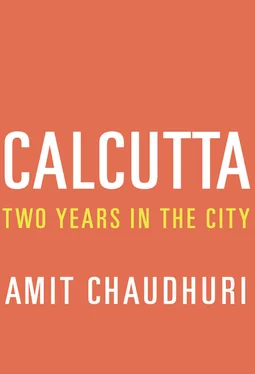Towards the end of the millennium, Samirda also sounded more anxious than I’d known him to be. The property he lived in, the two-storeyed building, was tangled in some obscure but fatiguing litigation with a charitable and spiritual organisation. The organisation was behaving in this matter with less empathy and greater aggressiveness than it likes to be known for. Of course, Ramakrishna, sage and idiosyncratic figurehead of the organisation, had once astutely advised his fellow seekers: “You can’t be shy and retiring all the time. You need to know when to bare your fangs.” Those words had a powerful subterranean message in an age of colonialism. But the mystic may not have wanted his followers to bare their fangs at this Cambridge-educated bhadralok with polio. The problem had arisen from some reckless action by a loopy relative and his wife, who had involved the organisation in a transaction that had been interrupted upon their deaths. The organisation, as a result, had turned its attention to these surviving Mukherjees. In a state of panic, Samirda had begun disguising his voice when taking telephone calls, croaking “Hello” in an anomalous, dislocating manner to ward off bogus litigants. His relief was audible when he realised it was a harmless acquaintance at the other end; “Sorry, baba!” he’d say, sometimes adding “Dash it all!” before explaining the situation, and then finally let the conversation embrace the usual constellation of subjects — Sandipan Samajpati, the young classical vocalist; beautiful society ladies (Samirda, with his wife’s blessings and abetment, was a passive aesthete of feminine beauty); the present Marxist government (he and Anitadi had, at some point, resolved that they were fellow travellers).
* * *
Samirda was all praise for a certain Mayank Shah, whose virtues he began to enumerate to me in the mid-nineties. Shah was a Gujarati financial advisor through whom Samirda had discovered the infinite promise of equity. He’d put Samirda’s savings into the market; “He’s doing wonders with my money, baba,” I was told in a tone of grateful disbelief. “I hope he’s being careful with it,” I said at one point, sounding elderly, fussy, and superstitious about unforeseen material gain, and feeling a little envious of Samirda’s triumphant entry into the new financial order of risk and growth.
Then, in a few years, he was groaning and complaining bitterly. “Awful fellow — he doesn’t pick up the phone any more.” Mayank Shah, who’d come every week in the mornings bearing good tidings, had vanished temporarily. “I’ve lost lakhs, baba.” The reason for Shah’s new elusiveness was that he’d played with his clients’ money; he had, lately, become his clients’ debtor. “ ‘Give me one month, Mr. Mukherjee. I will return every paisa,’ he’s saying now,” said Samirda, unable to resist derisively replicating Mr. Shah’s Gujarati inflections. All this happened well before the crash of 2008, at a time when the market, like the unfathomable gods of Hindu mythology, was appearing fully incarnate to its devotees, and offering them boons and wishes of their choosing. People were reaping the most absurd and undeserved rewards: new cars, new houses, new lives that the market had the power to create, for its followers, out of a little bit of capital. As a result, a new faith in fate and destiny— bhagya —was in the air: I heard the word mentioned deferentially, with wonder, by speculators, Bollywood singers, even book distributors — anyone who had anything to do with success. I recall a conversation I overheard when my second novel, Afternoon Raag , was about to be published in 1993. I was visiting my distributor, the savvy and expansively affectionate Lal Hiranandani of India Book House, at his well-lit office in a dingy building on Lyndsay Street. I’d groped my way up the dark staircase, and spotted Lal: he was speaking to a man (to whom he smartly introduced me) who looked like he’d never read a book in his life — probably a link in what was then a still fairly untested chain of Anglophone book distribution. They were staring, with a shared consternation and air of surrender, at the cover of the British trade magazine, the Bookseller , which announced news of Vikram Seth’s imminent A Suitable Boy . Lal’s interlocutor mentioned (in a dreamlike, rehearsed way, as if they’d had this exchange many times before, and would be compelled to have it again) the size of the near-imaginary advance the book had got — and, in a tic that Indian traders have, quickly translated the sum from pounds to rupees: “One and a half crores.” There was no more than a moment’s silence; then he touched his forehead and said, “Bhagya.” I’d never heard that word — immemorial, belonging to an arcane, resilient universe — used in such a context before, though I’ve heard it employed with that meaning since. It was as if the author, and his book’s merits, were irrelevant to the money it had earned: some ineffable element, which he called bhagya, but which was a bhagya that played upon, and through, the market, had produced this result — and confirmed the significance of his profession and calling, where he was an anonymous link.
Destiny, assuming Mayank Shah’s misleading persona, had, however, badly let down Samirda, and he was understandably bitter. About the matter of money, he was possibly a bit of a “duffer”; as we’ve all been proved to be.
The late nineties was a bad time for Samirda and Anitadi, coping with the charitable organisation and Mayank Shah. Apparently Anitadi would go to the court in the morning because of the litigation to do with the property, and come back dispirited and bewildered, not having followed a word of the legal gibberish.
And yet, at teatime, she was contained as ever; you relaxed as you were taken out of the uncertain realm of your own decisions, your own volition, into a place where she was the one in control. She knew just how long she had to wait before she poured the tea; you didn’t have to get anxious about it, because she was obeying an invisible metronome. Even Samirda, despite his mild agitation, was calming and reassuring. They represented the continuance of a wishful gentility; we, their guests, needed to see them in that way for about an hour, or an hour and a half. We had an idea that their lives were falling apart, but the tea was a rebuttal, for all concerned, of this melodramatic piece of knowledge — we wouldn’t be here if things were really bad.
Some sort of quick remedy was needed, though, for the mess Mr. Shah had made.
One afternoon, Anitadi, midway through the tea, said cheerfully that she wanted to sell two Chinese vases. Would we keep that in mind in case we knew any buyers? We were taken aback and shocked, but, at the same time, felt almost privileged we’d been asked. Anitadi’s eyes had a mischievous and confidential gleam — as if this, too, were somehow a “fun time,” like the Naxal period had been. There was a quiet effervescence about her.
A few months later, they told us they were thinking they’d sell the painting in the drawing room. Did we know anyone who’d be interested? The painting, as you entered the room, occupied the wall on the right; it was fairly large, dark, and, to my eye, unremarkable. I presumed it had no importance except as a halfhearted piece of family history, bought more to decently cover a space than to be looked at. I either sat with my back to it, or opposite it, depending on which side of the centre table I was seated. Now that Samirda mentioned they might want to sell it, he turned his head, as if to check if it was still the same painting, and I saw Anitadi regard it steadily with her calm, democratic gaze — a gaze that’s never either superior or obsequious — as if she were reassessing it, judging it in the light of something; as a result, I too felt encouraged — and obliged — to study it. I saw nothing in it that didn’t seem vague and phantasmagoric — the silvery glint of water, a solitary boat on a ghostly journey, and a kind of faint miasma at the back, which may have been foliage, rocks, or even cloud.
Читать дальше












